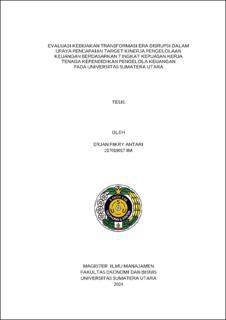Evaluasi Kebijakan Transformasi Era Disrupsi dalam Upaya Pencapaian Target Kinerja Pengelolaan Keuangan Berdasarkan Tingkat Kepuasan Kerja Tenaga Kependidikan Pengelola Keuangan pada Universitas Sumatera Utara
Evaluation of Transformation Policies in the Era of Disruption as an Effort to Achieve Target Performance of Financial Management Based on Job Satisfaction Level of Financial Management Staffs at Universitas Sumatera Utara

Date
2024Author
Antari, Erjan Fikry
Advisor(s)
Lumbanraja, Prihatin
Harahap, R Hamdani
Metadata
Show full item recordAbstract
This research aims to determine the level of satisfaction and expectations of Financial Management Education Personnel regarding USU's efforts and achievements in the Era of Disruption in adjusting rules/regulations and digital transformation in financial management, and in the management of financial management staff, also to determine the level of satisfaction and expectations regarding efforts and achieving USU's Financial Management Performance Targets in the Era of Disruption. This research uses mixed methods research (MMR), which integrates elements of qualitative and quantitative methods. The population in this research is all financial management educational staff in 48 (forty eight) work units within USU with a total of 124 respondents. The data analysis methods used are the Customer Satisfaction Index (CSI) method, the Importance Performance Analysis (IPA) method and the Gap Analysis Method (GAP). The results obtained in this research show that the level of satisfaction of financial management education staffs with the aclaptation of rules/regulations and digital transformation in financial management in the era of disruption is 79.8% in the satisfied category, adaptation of financial management rules/regulations is a top priority, but the achievement has not meet the expectations. In the management of educational employees, financial management was 70.14% in the satisfied category with 5(five) main priority indicators consisting of performance-based remmeration, implementation of a digital performance measurement system, increasing transparency and accessibility of information, the use of digital talent management system and analysis prediction data, as well as objectivity in selection, but the achievement has not meet the expectation. Meanwhile, the achievement of the Financial Management Performance Target was 76.82% in the satisfied category, with 2 (two) variables being the main priority, namely financial stability and increasing alternative income, but there has been no achievement as expected.
Collections
- Master Theses [1243]
